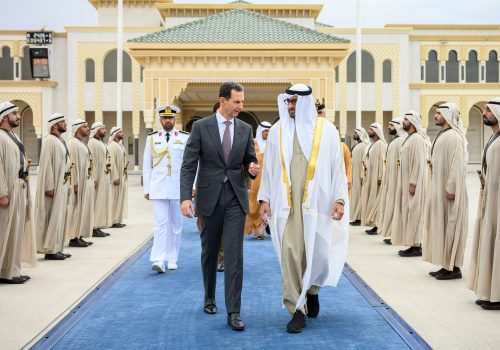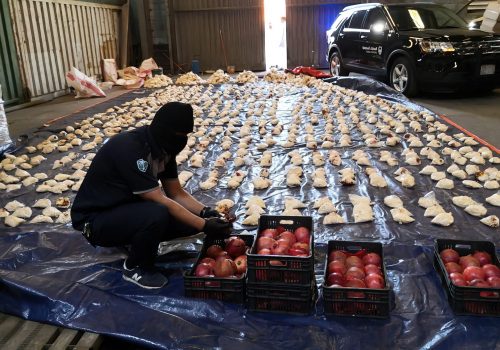No quick fixes for the Middle East’s captagon crisis
Over a billion pills of captagon, amphetamine-based drugs, were seized in Arab countries in Asia between 2019–2022—enough to carpet six football fields with 28 million pills left over, per my calculations.
The security, health, and geopolitical impacts of captagon’s proliferation have jolted many countries around the world into action. Consumer and transit countries in the region are enhancing their interdiction capacity and toying with the idea of normalizing relations with the Bashar al-Assad regime in Syria, which controls areas where most captagon originates. Furthermore, the Joe Biden administration has announced an interagency counter-captagon strategy and joint sanctions with the United Kingdom and European Union on Syrian and Lebanese actors involved with the industry, as well as including captagon in the US-led Global Coalition to Address Synthetic Drug Threats. However, the overall impact of these measures on the availability of captagon will be limited.
Partial solutions won’t work
Until now, most of the rhetoric on countering the flow of narcotics has come from Western countries adamantly opposed to the Assad regime. This is understandable, given that the regime sponsors and benefits from the industry. Over 70 percent of identifiable drug seizures originated from its control areas. But little action has been taken except the imposition of sanctions on individuals and entities known for producing and smuggling the drug.
Such sanctions signal the West’s principled position on the issue and highlight the need for accountability. However, sanctions have only a marginal impact on the ground; such entrenched and criminal kingpins are unlikely to change their behavior from sanctions alone.
The US inter-agency strategy is also unlikely to have a tangible impact. The primary consumer countries in the Gulf—Saudi Arabia and the United Arab Emirates (UAE)—seem to show a lack of interest in working with the US or any other Western country on the issue. As such, the inter-agency strategy gives the US government the tools to intervene, but it has no teeth in either producer or consumer countries.
In contrast to the US counternarcotics strategy, which focuses on “disrupt[ing], degrad[ing], and dismantl[ing] the illicit captagon networks linked to the Assad regime,” consumer and transit countries in the region wish to take a less confrontational approach in dealing with the regime. They believe they can lure Assad into disrupting the industry by using financial packages and diplomatic recognition after years of treatment as a pariah state.
However, contrary to the expectations of most observers and policymakers, this won’t solve the problem—even if Assad should agree to switch the tap off in his control areas. Other regional actors, including Hezbollah and the Iraqi Popular Mobilization Forces (PMF), also know how to produce captagon and have supplied it, albeit in smaller quantities. There has also been a minuscule drug supply coming from opposition-held areas in northwest Syria and, for the first time, Iraq. As demand holds steady in consumer markets in the Gulf, squeezing the supply out of regime-held Syria will only push it into other Syrian regions or to neighboring countries—most prominently, Lebanon and Iraq.
This well-established phenomenon of limiting the supply of narcotics in one country only to have suppliers pop up in another is known as the balloon effect. For example, in the late 1980s and early 1990s, Peru, Bolivia, and Columbia all tried at different times to eliminate coca plants used for making cocaine. But because they did not coordinate—with some spraying fields while others deployed incentive-based schemes—their policies resulted in only local successes in one country at the expense of the others. The supply to consumer markets, primarily the US, continued unabated.
With makeshift captagon production facilities dotting the border between Syria and Lebanon, producers can move their production toolkit—which, in its basic form, can fit in a single van—over the virtually nonexistent border overnight. By the same token, booming production in Eastern Syria can move into Iraq, as the PMF and other Iranian-backed actors are heavily involved in the sector and control large parts of the border between the two countries.
The fact that most captagon currently emanates from Assad regime areas does not mean that stopping that supply source will solve most of the problem.
For this multi-pronged crisis, partial solutions will have partial impacts.
Short-term solutions won’t work, either
Focusing on punishment in the here and now to suppress the demand for narcotics does not work—neither in the Middle East nor anywhere else where drug use remains a criminal offense. In Saudi Arabia, for example, reporting a teenage addict to the authorities will land them in jail for up to three months. Not only is a jail sentence detrimental to the well-being of the teenager and tends to increase the likelihood of future offenses, but it also hinders information-sharing and tip-offs because the stakes are so high.
With limited alternative revenue streams for many people in the Levant and some lawlessness in the region, restricting the supply of narcotics in the near-term is next to impossible. Escalating the security response to distributors in consumer markets or adopting a shoot-to-kill policy at the Syrian-Jordanian border may raise the risk for traffickers. Still, it will have a minimal impact on a youth looking to party with their friends or a foreign worker trying to drive a truck for twelve hours so they don’t lose their job and can get the pills they seek.
Cutting off supply is tempting and feels logical. After all, if there are no pills to consume, demand must stop. In practice, however, it rarely turns out that way. Demand fuels supply. As long as demand flourishes, supply will find a way (if captagon is somehow stemmed, there will be another drug waiting in the wings).
For a sustainable solution to the crisis, consumer markets must focus more energy on reducing demand through education, awareness-raising, and addressing the underlying social and economic drivers of consumption. These are long-term endeavors.
Solutions need to be smart
Even holistic and long-term solutions may not be sufficient if they aren’t smart.
Most observers of the region are eagerly waiting to see what Assad’s next step will be. Will he accept the offers of limited political rehabilitation and economic support in exchange for stemming the flow of narcotics? Or will he continue to sponsor the industry and forgo improving relations with Gulf states? Assad’s history suggests he’ll aim for both: giving the impression of trying to crack down on the industry to receive benefits from Gulf states while continuing to sponsor the trade.
Given his history, assuming that Assad will crack down on the industry in exchange for conditional economic support and political recognition is misguided. Following the 2003 invasion of Iraq, Assad helped turn the situation into a quagmire for the US and its allies, all while claiming the transit of foreign fighters was simply due to impossibly porous borders. Assad even compared it to the difficulty the US faces in attempting to control the flow of migrants from Mexico.
Furthermore, a smart policy response to the crisis will focus less on punishment and intimidation while focusing more on harm reduction and helping addicts deal with their addiction—in which case far more answers will be found in Riyadh and Abu Dhabi than in Damascus.
Portugal took a unique approach to addressing drug addiction in 2001 by decriminalizing the possession and use of drugs. Instead of punitive measures, they focused on treating drug proliferation as a public health issue. The Portuguese government invested in harm reduction programs, prevention initiatives, and comprehensive treatment services. This shift in approach led to fewer drug-related deaths, lower HIV transmission rates, and fewer drug-related crimes while also promoting the reintegration of recovered addicts into society.
While similar policies are unlikely to be adopted in the conservative Middle East, they’ve also had unexpected drawbacks. For example, while proponents of decriminalization or the outright legalization of drugs argue that it destigmatizes drug addiction, critics worry that it may normalize drug use, especially among younger generations. Normalization could potentially lead to higher rates of addiction in the long run if the right-to-use overshadows a focus on treatment, which Portugal is beginning to struggle with after twenty-plus years since their policy shift.
No policy is bulletproof, but some are smarter than others. If the metric of success is minimizing the number of addicts on the streets, arresting anyone that looks like an addict might sound like an appropriate policy; such procedures are currently used in the Philippines and El Salvador. However, unfair and extreme policies ultimately cause more harm than good. But suppose the metric of success is eliminating the demand for drugs so that supplying them from Syria or elsewhere is no longer lucrative? In that case, policies should look further ahead and deeper into the causes of the demand in the first place. Fix the causes, and the rest will take care of itself.
Dr. Karam Shaar is an independent consultant focused on Syria’s political economy and a non-resident scholar in the New Lines Institute. Follow him on X: @Karam__Shaar.
Further reading
Thu, Apr 6, 2023
Arab states are normalizing with the Assad regime. This is the Middle East’s 1936 moment.
MENASource By
Now diplomatic relations are set to be restored between Syria and two behemoths of the Arab League: Egypt and Saudi Arabia, who are the holders of the all-important veto on Assad’s return to regional respectability.
Fri, Jun 9, 2023
Assad is appointing new military officials to escape sanctions on Syria
MENASource By
Of the thirty Syrian army and security officers in new leadership positions, only two are blacklisted. This indicates a significant gap.
Mon, Jun 14, 2021
Narcos: Syria edition—and what the US can do about it
MENASource By
Little-consumed outside the Middle East, captagon—also known as the “poor man’s cocaine”—has proliferated, owing to an industrial boom centered predominantly in war-torn Syria, where the embattled regime of Syrian President Bashar al-Assad now relies on narcotics as a financial lifeline.
Image: The Guardia di Finanza of Naples has seized in the Port of Salerno a large quantity of drugs, 14 tons of amphetamines, 84 million tablets with the "captagon" logo, produced in Syria by ISIS to finance terrorism. The value of the drug, found by the "yellow flames" in three containers, has been estimated at over 1 billion euros. The drug had been hidden in industrial paper cylinders and machinery constructed in such a way as to prevent scanners from detecting the contents. Salerno, near Naples, Italy, on July 01, 2020. Photo by Alessandro Garofalo/Newfotosud/napolipress/Fotogramma/IPA/ABACAPRESS.COMNo


